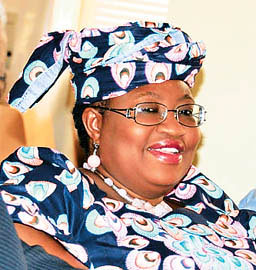
Dr. Ngozi Okonjo-Iweala, Managing Director of the World Bank, is the Finance Minister for the Federal Republic of Nigeria, has drawn attention to the national debt in Africa's largest populated state., a photo by Pan-African News Wire File Photos on Flickr.
Nigeria’s finance minister eyes top WB post
Saturday, 24 March 2012 00:00
PRETORIA — Nigeria’s finance minister will run for the World Bank top job, her South African counterpart announced yesterday, the deadline for nominations to succeed Robert Zoellick.
The announcement highlights a landmark push from emerging countries for high-profile roles in
those international institutions which have remained the preserve of advanced nations.
“We are proud to confirm that the Nigerian Finance Minister Ngozi Okonjo-Iweala will be a candidate,” Pravin Gordhan told reporters at a press conference, standing alongside her.
Okonjo-Iweala had been rumoured as a possible candidate with emerging economies pushing for a representative at the bank.
The World Bank has 187 member nations and focuses its activities on development loans.
The top job has been held by an American since it was founded nearly 70 years ago.
Days after her spokesman denied she was pursuing the job, Okonjo-Iweala said she was “absolutely” confident of her bid.
“I have long experience in the World Bank, in government and in diplomacy and I look forward to giving you my vision at the appropriate time,” she said.
Okonjo-Iweala is a respected former World Bank managing director who joined Nigeria’s government as finance minister in August.
“I share the World Bank vision of fighting poverty with passion. The issue is in what direction one must take this to make this the most beneficial,” she said.
Nominations were due yesterday with Zoellick stepping down at the end of his term in June, with the United States yet to announce a candidate of its own.
Under a tacit agreement since the World Bank and its sister institution the International Monetary Fund were founded nearly 70 years ago, the United States always selects an American as World Bank president and Europe puts a European at the IMF helm.
That traditional arrangement governing the two 187-nation institutions has triggered outrage from developing and emerging economies seeking greater representation to reflect their rising contributions to the global economy.
The race to lead the World Bank was set in motion after Zoellick announced on February 15 he was stepping down at the end of his term.
The US Treasury that same day declared “the United States continues its leadership role in the World Bank,” as the largest shareholder, and would announce its candidate “in the coming weeks.”
Since then, the Treasury has declined to comment on the nomination process.
Secretary of State Hillary Clinton shot to the top of the rumour mill, after a former Colombian finance minister and central bank chief, Jose Antonio Ocampo, announced his candidacy on Wednesday.
Clinton has long been among the most circulated names rumoured to be under consideration by President Barack Obama, along with UN ambassador Susan Rice, Democratic Senator John Kerry and former Treasury secretary Larry Summers.
Clinton has insisted that she is not interested in the job.
Another American, economist Jeffrey Sachs, has garnered support for his self-declared candidacy in small developing countries.
Sachs, the director of the Earth Institute at Columbia University, has a decades-long career in development and poverty eradication and headed the United Nations’ Millennium Development Goals project.
A candidate must be presented by the Bank’s 25 executive directors, or by governors through the director representing them on the executive board.
The World Bank said that if there are more than three candidates, it will release a short list of three candidates but did not indicate the timing of the publication. — AFP.
No comments:
Post a Comment